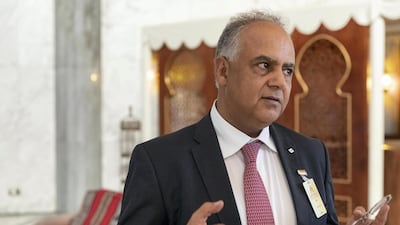A new Geneva Convention could be required to tackle the unrestricted rise of robot and cyber warfare, a top official from the International Committee of the Red Cross has said.
There is no international treaty governing autonomous weapons and new rules may be needed to ensure responsibility is not transferred from people to machines, Yahia Alibi, head of the regional delegation for the GCC, told The National on the sidelines of a high-level military event in Abu Dhabi that will discuss the laws of war.
ICRC is an international body that tries to safeguard the Geneva Convention and promotes laws that protect victims of war.
The event, the Senior Workshop on International Rules Governing Military Operations, is being held in the Middle East for the first time this week.
Close to 150 high-ranking officers from more than 80 countries gathered in the capital to discuss military rules, the rise of new technology and protecting the dignity of people whose lives have been torn apart by conflict. The rise of autonomous weapons is a primary area of concern.
"It is a huge challenge facing international humanitarian law," said Mr Alibi.
Existing military rules make vital distinctions between civilian and military targets. But there are fears that a robot will not be able to do that.
"Autonomous weapons raise fears that humans could lose control and this would go against the basic requirements of law, such as accountability," said Mr Alibi.
"It is forbidden to target civilian assets. How can new weapons understand this? Militaries have to respect [that rule] and responsibility cannot be transferred to machine."
The 1949 convention was founded on basic principles such as treating prisoners of war humanely, giving those wounded in battle medical treatment, safeguarding medical staff and hospitals in warzones, and protecting civilians. But the rapid recent expansion of autonomous weapons has left the international community struggling to catch up and agree on new rules governing their use.
_______________
Read more:
ICRC chief: UAE 'core' contributor to humanitarian missions in Yemen
UAE, ICRC sign agreement on humanitarian aid in Yemen
_______________
Mr Alibi suggested a new Geneva Convention could be required to deal with the issue, while the ICRC has established a special unit to look broadly at the issue.
"We are engaging with states to tell them we have a problem here," he said.
The Swirmo conference is convened by the ICRC and workshops will be held in Arabic and other languages to talk about changes in war and how law is applied on the battlefield over the next week.
"The reality we live in means armed conflicts are a problem for the whole world, especially the Middle East," said Maj Gen Falah Al Qahtani, assistant under-secretary for policy and strategic affairs at the Ministry of Defence, which is co-hosting the event.
"We respect international law and it is the duty of officers and soldiers to abide by these laws."
The instructors who lead the workshops are also military officers and the focus is integrating international humanitarian law into live combat and police operations.
"The hope is the officers walk away with an understanding of the law set against the challenges they face on the battlefield," said Kenneth Hume, head of the armed forces unit at the ICRC.
"It is not enough to know the law. It is not enough to have classroom instruction. Law has to be integrated into military doctrine, training and education and there has to be a sanction system. We are there to support militaries to do that."
Swirmo also provides expertise on the ICRC's global mission, its significance and role in international conflicts.
The event continues at the Armed Forces Officers Club in Abu Dhabi until Thursday.


